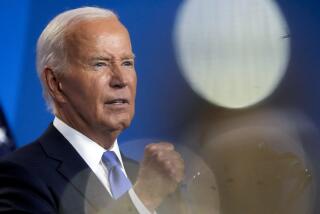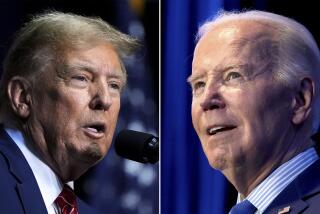Front-Loading Primaries Stirs Complaints in GOP
- Share via
WASHINGTON — Hoping to steal some of the glory reaped by Iowa and New Hampshire, the two states that traditionally kick off the presidential election year, a number of states, big and small, moved up their primaries this year.
But what they got for their trouble was to put the entire political process on fast-forward--voting begins in just over three weeks and the Republican nomination could well be settled less than a month later--raising the stakes in those two early skirmishes even higher.
In fact, with the likelihood of a GOP standard-bearer being picked before April, months before the party’s convention, there are complaints that the changes will diminish the already-limited opportunities for voter participation and for meaningful debate on the campaign issues of 1996.
“Now what happens,” said David Keene, a longtime advisor to the front-runner, Senate Majority Leader Bob Dole of Kansas, is that “Iowa and New Hampshire start a snowball rolling downhill that can’t be stopped. There’s no place where voters can stand back and take a look at what’s happening.”
Charles Arlinghaus, executive director of the New Hampshire GOP, agrees. “In the past there was still time to do grass-roots campaigns in the other states. But now everything becomes just press conferences and television ads.”
As a result, the two leadoff states are basking in the limelight again. “It’s put more attention and focus on Iowa and New Hampshire than ever,” said Iowa GOP Chairman Brian Kennedy about the 1996 political calendar, which includes the state’s precinct caucuses on Feb. 12.
Kennedy cites a study by Drake University analyst Hugh Winebrenner indicating that the time candidates have spent in Iowa until now has increased by 20% from the 1988 campaign, the last GOP contest to see full-scale competition for the nomination.
Winebrenner also points out that even before the start of this year, the GOP contenders had invested about $1 million in television advertising on central Iowa stations alone. This is the first time any money has been spent on Iowa television in the year before the presidential election.
In New Hampshire, the state party is tapping into the political bull market in advance of its Feb. 20 primary. Encouraged by the capacity crowd at last year’s $100-a-plate annual fund-raising dinner, party officials decided to raise the tab to $150 for this year’s roast turkey feast on Jan. 7. And with the help of the free-spending presidential campaigns, party officials boast that they got another sellout.
No Long Pauses
All this is because, under the extra-condensed calendar, political managers are convinced that only candidates who excel in the early tests will be able to generate enough funds and political momentum to compete effectively in the rest.
“The bump from doing well in Iowa and New Hampshire will be bigger than ever because it will carry over into more states in less time,” said Mike Murphy, chief strategist for former Tennessee Gov. Lamar Alexander’s campaign. “We don’t have the long pauses like we used to between votes.”
If the rewards for success are expected to be greater, so are the penalties for not doing well. “The front-loading means you have less opportunity to recover from any mistakes,” said Bill Dal Col, campaign manager for publisher Steve Forbes.
The net result of the change, conventional wisdom now holds, is to make the nomination of Dole, by far the best-known of the contenders, even more likely, a theory heartily endorsed by the Dole camp. “This is a huge advantage for our campaign,” said one of its senior officials.
And Dole’s strategists view Iowa and New Hampshire as the key to exploiting that advantage. “There are two defining events in February, the Iowa caucus and the New Hampshire primary, and we are totally focused on those,” said Dole campaign manager Scott Reed. “These are what the national media will use to gauge and mark who is doing well and who is out of the race.”
But some feel that if Dole should stumble along the road to the GOP national convention Aug. 12-15 in San Diego, the compact schedule could work against him. “If he really does well early, he can’t be caught,” conceded Tom Rath, an advisor to Alexander. “But on the other hand, if somebody sticks a pin in his balloon early . . . the momentum will compound the defeat and it will be harder for Bob Dole to recover.”
A Safe Bet
While the odds on the competing contenders may shift, one safe bet is that the GOP nomination will be settled earlier than in any contested race in recent years.
Just look at the numbers. By mid-March 1992, only 14 states with 631 delegates had cast their ballots. By the same time in 1996, 23 states will have chosen nearly 1,100 delegates, more than the majority of delegates needed to formally anoint the GOP standard-bearer in August.
Among the states that have moved up in the calendar this year are three of the biggest: California, New York and Ohio.
Whoever emerges as the winner of the GOP contest, some believe that members of the electorate will be the big losers because voters in the states that follow New Hampshire and Iowa will have little firsthand exposure to the candidates.
Of course, all this is a far cry from the bad old days of presidential politics, when rank-and-file party members had almost no say in selecting presidential nominees.
“In each major party, some 50 to 100 men--state leaders, local bosses, elder statesmen, big contributors--decided nominations,” Harvard University presidential scholar Richard Neustadt wrote of those times. “These party barons actually controlled and could deliver delegates at national conventions.”
Resentment of these excesses led to the reform movement in the Democratic Party and triggered the proliferation of presidential primaries in both parties, which dramatically broadened voter participation in the nomination process. But as beneficial as some of these changes were, efforts of party leaders to manipulate the process have created defects as large as some of the initial problems.
“I think the system is stupid, and it seems to get worse every four years,” said Keene, who was political director for George Bush’s 1980 campaign.
While the primary system that evolved two decades ago was far from perfect, if offered two important benefits, Keene said. The opening rounds in Iowa and New Hampshire gave a little-known candidate a chance to emerge, while the subsequent contests, spread gradually over more than four months, allowed voters a chance to look the person over.
This time, however, the premium is being put on scoring early, and Dole’s rivals at least have theories of how the quirks in the calendar can be used to their advantage.
Sen. Phil Gramm of Texas has plunged into the Louisiana caucuses, where 21 delegates are at stake Feb. 6, a week before Iowa’s contest. In his effort to make an end run around New Hampshire and Iowa, Gramm is also focusing on contests in Delaware, Feb. 24, and Arizona, Feb. 27.
Gramm expects to win enough delegates in these states “to give him insulation even if he finishes third in New Hampshire,” said his senior advisor, Charles Black.
Over the long run, Black claims, the contest will come down to a battle between Dole, with his base in the Northeast and Midwest, and Gramm, whose base is in the South and West.
“Gramm will have the advantage,” Black said, “because 55% of the delegates are from the South and West.”
But Patrick J. Buchanan, Gramm’s chief competition for the backing of hard-line conservatives, sees Louisiana as an opportunity to boost his own candidacy at Gramm’s expense. Bay Buchanan, her brother’s campaign manager, doesn’t expect to win in Louisiana, but intends to do well enough “to make a statement to Iowa and New Hampshire that we can beat Phil Gramm any day in the week.”
Focus on Forbes
Meanwhile, all the candidates are anxiously eyeing Forbes, whom Bay Buchanan dubs “the multimillion-dollar gorilla.” The political newcomer has spent more than $7 million so far on ads slamming his opponents and promoting his flat-tax plan as a solution for the nation’s economic ills.
In early polls, Forbes appears to have pulled into second place behind Dole in most of the early contests, prompting other candidates to begin attacking his flat-tax plan.
Dal Col suggests that the crammed calendar is well-suited to his candidate’s political style. “It forces you to get issue-specific quickly,” he said. “We believe we have an Information Age campaign,” in contrast to other candidates who have made a greater effort to build organizations in the various state battlegrounds, a process that Dal Col derides as “bureaucracy intensive.”
On the other hand, Murphy brags about the organizational efforts Alexander’s campaign has made to ensure he has full slates of delegates in key states that will hold their contests after Iowa and New Hampshire.
“If we do our job in Iowa and New Hampshire and become the alternative to Dole, our greatest problem is to make sure we have delegates in the states down the line,” Murphy said. He pointed out that Gary Hart failed to slate delegates in a number of states after his stunning upset victory in the 1984 New Hampshire primary, contributing to his eventual defeat by Walter F. Mondale in the battle for that year’s Democratic nomination.
Sen. Richard G. Lugar of Indiana also aims at becoming the alternative to Dole, and his campaign is taking dead aim at Alexander, whose defeat is viewed as essential to Lugar’s own success. “In Iowa our benchmark is beating Alexander because he is the only other candidate capable of tapping Dole’s political base,” in the Midwest and among party moderates, said Lugar’s manager, Mark Lubbers.
But Lubbers said he is not fooling himself about the difficulty of the challenge in overtaking Dole. “Our strategy has always been based on the recognition that if Dole keeps the wheels on his campaign, he will be the nominee,” he said. “Anybody with a different kind of strategy is smoking something funny.”
* PRISON COSTS: Dole and California Gov. Pete Wilson assail president for vetoing funding. B1
More to Read
Sign up for Essential California
The most important California stories and recommendations in your inbox every morning.
You may occasionally receive promotional content from the Los Angeles Times.













